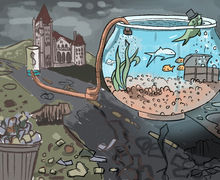Cortland student combats sexual assault in marginalized communities
Madeleine Davison | Staff Writer
Tatiana Nolen, a sexual assault survivor and student at State University of New York at Cortland, has been speaking about sexual assault in marginalized communities.
While in bed about two years ago, Tatiana Nolen was sexually assaulted by a family friend.
Since then, the sophomore at the State University of New York at Cortland has wrestled with the nightmares, guilt and self-blame that often haunt sexual assault survivors. And as a black and Puerto Rican woman, she has faced the additional burden of racist stereotypes, she said.
Nolen is now helping others overcome the challenges faced by people of color who seek support after being sexual assaulted.
Researchers at Wayne State University found in a 2010 study of sexual assault survivors that while 67 percent of white women had disclosed the incident to someone, only 52 percent of black women had done the same. When black women did disclose, they were more likely than other women to be met with negative reactions, according to the study.
“People have that assumption of, ‘OK, well, you’re an African-American woman, you’re a Puerto Rican woman, you’re asking for it because you dress this way or you show off your body this way.’ … It’s hard, on a white campus,” Nolen said.
Chardonnay Madkins, project manager for the activist organization End Rape on Campus, said the challenges faced by people of color — black women in particular — are often left out of conversations about sexual violence.
In October, Madkins well help End Rape on Campus launch “Centering the Margins,” a project that aims to empower survivors from marginalized communities and prevent sexual assault. The project seeks to educate students through a blog series and lectures on college campuses nationwide.
Madkins said many people implicitly subscribe to racist tropes that cast black women as promiscuous, sexually available and invulnerable to emotional pain, which can cause them to treat black survivors dismissively.
These factors can discourage black women from disclosing sexual assault and seeking help, she said.
“When (survivors of color) come forward and this person really can’t relate to them or really does not see their humanity because of all these implicit biases, they essentially end up failing them and end up dismissing the case,” Madkins said.
The first responses survivors receive upon disclosing an incident can set the tone for their recovery process.
Women who receive negative responses from people they disclosed to experience more frequent PTSD symptoms, said Angela Jacques Tiura, an assistant professor in Wayne State’s School of Medicine who co-authored the 2010 study of sexual assault survivors.
At Syracuse University, the 2016 Campus Climate Assessment Project found that black respondents were less than half as likely as white respondents to feel “very comfortable” with the climate on campus.
And while 12 percent of respondents reported having had an “unwanted sexual contact” while at SU, only 12 percent of all victims of “unwanted sexual contact” disclosed the incident to any SU resource.
On Friday, SU Chancellor Kent Syverud accepted the recommendations of the Climate Assessment Planning Committee, instituting — among other things — a first-year course covering topics such as diversity and inclusion and sexual assault prevention.
“I want to say there’s an effort to … create a space that helps everybody instead of just one group of people, but I will say that SU — well, they definitely need to do more,” said Kendiz Moore, president of SU’s Sex S.Y.M.B.A.L.S., which stands for Sexually conscious, Youthful, Mature Black and Latino Students.
The SU Counseling Center did not respond to a request for comment filed via its website, and an email requesting an interview was met with a reminder to use the online form.
As many as 23 percent of college women experience rape or sexual assault, according to the Rape, Incest and Abuse National Network.
Some colleges and universities have made special efforts to reach out to black women and other survivors of marginalized identities in an attempt to ensure disclosures are met with understanding and support.
Jessica Jennrich, director of the Women’s Center at Grand Valley State University in Michigan, said the school’s staff is primarily women of color.
“It sends the message that (the school) is a safe place for students of color, and they have someone to talk to,” Jennrich said.
Nan Pasquarello, Cortland’s Title IX coordinator, said she tries to foster relationships between multicultural student organizations and the Title IX office, which handles sexual assault investigations on campus. Those relationships aim to help students of color feel comfortable asking for assistance, she said.
Nolen said Pasquarello helped her work through her feelings of guilt and self-blame. Pasquarello also coached her when she was subpoenaed for trial.
“Nan has been one of the best things that’s ever happened for me … She never left my side when I needed her,” Nolen said.
Nolen decided to join S.A.F.E.R., Students Active for Ending Rape, in part due to Pasquarello’s influence. In April, she told her story to a large audience for the first time at a forum about sexual assault in marginalized communities.
She said she wants to prove that sexual assault survivors can go on to lead fulfilling lives.
“I’m a college student getting my education. I’m setting a career for myself,” Nolen said. “I still want to have a family, I want to be able to love someone, I want to be somebody’s wife one day. … (and) I want to help people do that the way Nan helped me.
Published on September 19, 2017 at 11:13 pm
Contact Madeleine: mdavison@syr.edu





